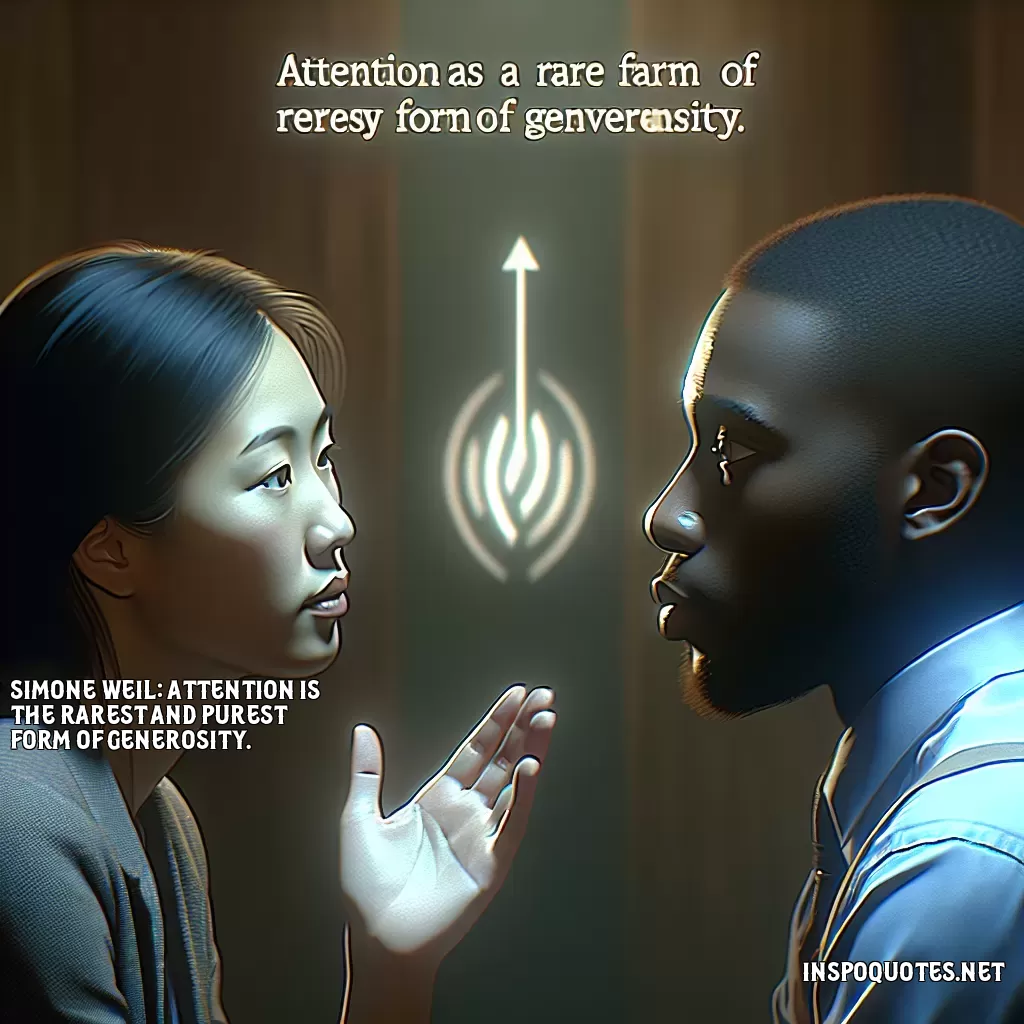
Simone Weil: Attention is the rarest and purest form of generosity.
Author: Simone Weil
👁️ 8 views
Simone Weil's quote, "Attention is the rarest and purest form of generosity," suggests that the act of truly paying attention to someone or something is both uncommon and deeply meaningful. In a world bustling with distractions and divided focus, giving someone our full attention can be a profound and selfless gift. When Weil refers to attention as "rare," she acknowledges that despite living in an age abundant with communication tools and connectivity, the genuine act of truly listening and being present with another person is not frequently practiced. Too often, people engage with others while partially distracted by their own thoughts, devices, or external stimuli, leading to superficial interactions. Meanwhile, the "purest form of generosity" highlights the idea that attention requires us to give something of ourselves without expecting anything in return. Unlike material gifts, which can be given without much thought or engagement, attention necessitates a deep involvement and interest in the other person's well-being, thoughts, or feelings. It is an act of opening ourselves up to understanding, empathy, and compassion, free from self-interest. Moreover, giving our attention implies a temporary suspension of our own ego and needs. In truly attending to another, we prioritize their needs, stories, or problems, which can be both affirming and healing for them. Truly listening and being present allows us to build meaningful connections, convey respect, and nurture relationships. This selfless act of engagement embodies a pure form of generosity because it often entails sacrificing one’s own time and mental space for the well-being of another. Ultimately, Weil's perspective encourages us to value and practice attentiveness, recognizing it as a potent means of contributing positively to the lives of others and fostering deeper human connections.
Quote By: Simone Weil
Simone Weil (1909–1943) was a French philosopher, mystic, and social activist known for her profound and often challenging ideas on ethics, politics, and spirituality. Born into a well-educated Jewish family in Paris, Weil displayed remarkable intellectual abilities from a young age. She studied at the prestigious École Normale Supérieure, where she was influenced by the works of great philosophers and leftist politics. Weil was deeply engaged with the issues of her time, particularly the societal struggles of the working class, and she worked as a teacher and laborer to better understand the lives of those she fought for.
In the late 1930s, Weil became increasingly involved in political movements, participating in the Spanish Civil War on the Republican side, which greatly impacted her views on violence and justice. Her experiences in Spain led her to a deep reflection on the nature of oppression and the moral responsibilities of individuals. Simone Weil's writings often blend philosophical inquiry with spiritual contemplation, emphasizing the need for compassion and a deep recognition of the suffering of others.
Weil's major works, such as "Gravity and Grace" and "The Need for Roots," reveal her unique perspective on the relationship between the individual and society. In "The Need for Roots," she argues for the necessity of reconnecting with one's roots as a foundation for social stability and individual identity. Throughout her writings, Simone Weil grapples with the nature of love and attention, proposing that genuine attention to others is a form of love that can lead to social transformation.
Despite her relatively short life, Simone Weil's legacy endures through her thought-provoking essays and philosophical inquiries. She was not only a thinker but also a deeply empathetic individual who sought to bridge the gap between intellectual critique and concrete action. Weil’s insistence on the spiritual dimensions of human existence and her commitment to social justice continue to resonate in contemporary discussions of philosophy, ethics, and the human condition. Her life and work exemplify a dedication to truth and justice that remains inspiring to many.